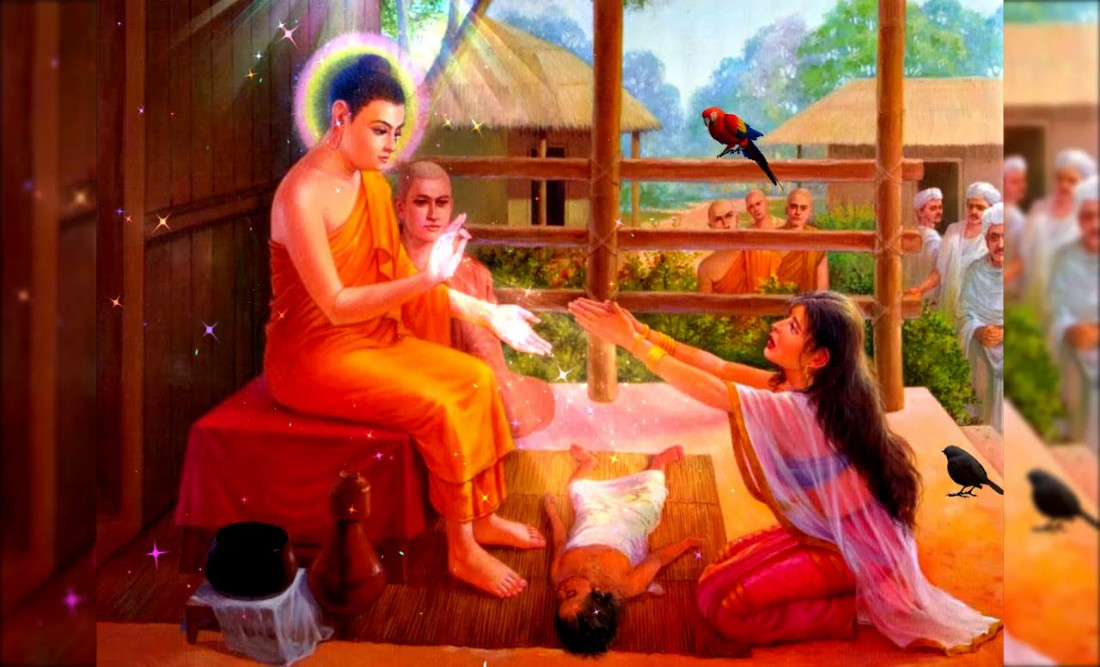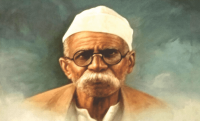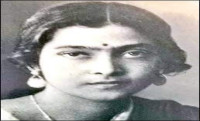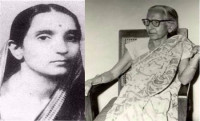Krisha Gautami - Life History

The knowledge of the reality of 'death' is definitely obtained from the life story of Krisha Gautami. With this it is also proved that how God used to use his wisdom to solve the biggest problems. This story also reveals that the Lord was a great psychotherapist.
One who considered the ideal of his life to be a simple dress-bearer, to become a sacrificed bhikkhuni. To attain that position, he did hard spiritual practice throughout his birth. While falling from the storm of misery, he found refuge in that great light which destroyed the cover of his darkness and showed him the happy path of liberation. She marched in that direction with courage and was successful in attaining the highest status of Arhatva. The name of this Nari Ratna was 'Gautami'.
With the birth of a woman, she often has to deal with many complications. And if she is the beloved daughter of a poor household, she has to repeatedly hit the brink of poverty, drowning in the tumultuous waves of misery, neglect, taunting and hard labour, where her tender heart shatters her worldly ambitions. Gautami, the daughter of a low-caste poor household of Shravasti, was called Krisha Tami (Pali-kisa Gotami) due to being thin since childhood. Somehow, in the shadow of her parents, Gautami, experiencing some affection and happiness, became young after spending her childhood. The parents thought, if they get married in a good house, they will be able to see their unhappy daughter happy, but they could not make her happy even after sacrificing everything.
As soon as she stepped foot in the in-laws' house, her mother-in-law - sister-in-law - all welcomed her with disregard and sarcasm. Hiding the tears in the lap, listening to the sarcastic arrows, kept serving her husband and mother-in-law. He had to do all the household chores. Getting up before the day and sleeping after all and working hard throughout the day had become his destiny. Once spring came in the life of Krisha-Gautami. She became pregnant and a son Ratna was born to her. The newborn was very beautiful. His father-in-law saw Deepak grandson of his lineage. There was no limit to his joy. As the mother of the grandson, she made some corrections in her dealings with her daughter-in-law Gautami.
A symbol of his mother's happiness, the child grew up and started playing new games. Krisha used to be very happy to see the child grooming, pampering and watching his games. One day suddenly a thunderbolt fell on him. His son was bitten by a snake and the child died. When Krisha heard this news, her grief knew no bounds, she fell down after being left behind. When she broke unconscious, she used to go frantically on the path carrying the dead son, asking that someone should give such medicine to her son, so that he can be resurrected.
Citizens - Citizens used to express sorrow on seeing him, but to remove his sorrow was beyond their control. Somebody said- 'Krisha! Lord Tathagata Samyak Sambuddha will be able to give you such a medicine which will make your red spirit rise. ,
Lord was roaming around preaching Dhamma. Krisha Gautami saw him and ran and fell at his feet. Crying, she said- "She is the neglected woman of the husband and home, her only support was her son, he was also snatched from her, God bless her, have mercy on her." ,
God explained a lot to that mourning mother, but her crying did not stop. Then he used his intelligence. Tathagata Buddha said- "Gautami! You bring some mustard seeds from some house. But remember to bring these grains from a house where no one has ever died, your son will rise again. ,
Gautami went from house to house, door to door and begged for a handful of mustard seeds. If the kind man and woman would give her a whirlwind, she used to ask if anyone died here? There is no house to be found where no one has died. In the end, disappointed Krisha Gautami returned again at the holy feet of the Lord. He said - "God! Such mustard was not found, as you had ordered to bring mustard. There is no house where no person has died. She heard the nectar showering voice of the Lord, understood and fell at His feet. That auspicious sermon was - 'Krishe! Birth and death is the rule of the world. Grief did not come only on you, it falls on everyone, then why are you so sad? "The darkness of mourning in his heart vanished.
She took Pravrajya after performing the last rites of her dead son and became a bhikkhuni. After taking refuge in the three jewels, he attained the position of Arhat.
While experiencing her past life, she has said - In her previous birth she was Lavanyavati daughter of a Kshatriya feudal lord. Lord Padmottara Buddha used to go to listen to that sermon. One day a sacrificing simple clothed bhikkhuni, being admired by the Lord, wished to become a bhikkhuni, but despite trying in that birth, she could not fulfill her wish.
In the second birth, during the time of Lord Buddha, she was born in a poor family of Sravasti, suffering grief reached Mahakarunik's shelter and her wish for the whole life was fulfilled.
The saga that he has told in the gaiety of attainment of knowledge is as follows - it has a beautiful depiction of the impermanence of the world, the sorrows of queen life and the happiness of nirvana. Today Krisha-Gautami is not there, but the stories told by her bring her memory to the fore.
Bhikkuni Krisha Gautami has sung in her Udana – “The birth of a woman is sorrow. Lord Tathagata, who pacifies the mind of human beings, has said so. "......" Child - childbirth is a pain. Sometimes the fetus comes in the mother's stomach, destroys itself and the pregnant mother. "
“A woman who is saddened by sorrows eats poison. He gives his life by hanging. ,
But by following the path of immortality, the Arya-Ashtangaik path, I have realized Nirvana.
The nectar beyond death, the one who has attained Nirvana. Elsewhere in a Udana (Harshad Udgaar) she says – “I am free from pain today. My duties are done. That's what I say Krisha Gautami".
Bhikkuni Krisha Gautami, while depicting the miseries of the ever-stricken woman, made it clear that in the shelter of the Triratna, she gets salvation (protection) from sorrows.

Manoj Bhiva
Manoj Bhiva is a dedicated writer who loves to write on any subject. Manoj Bhiva maintains a similar hold on politics, entertainment, health, abroad articles. Manoj Bhiva has total experience of 3 years in web and Social. Manoj Bhiva works as a writer in Wordict Post.
Russian Rocket 'Totally Destroys' Dorm, Unknown Amount Dead: Zelensky
Posted on 18th Aug 2022

Congresswoman Alma Adams from North Carolina is found to have COVID-19
Posted on 15th Aug 2022








